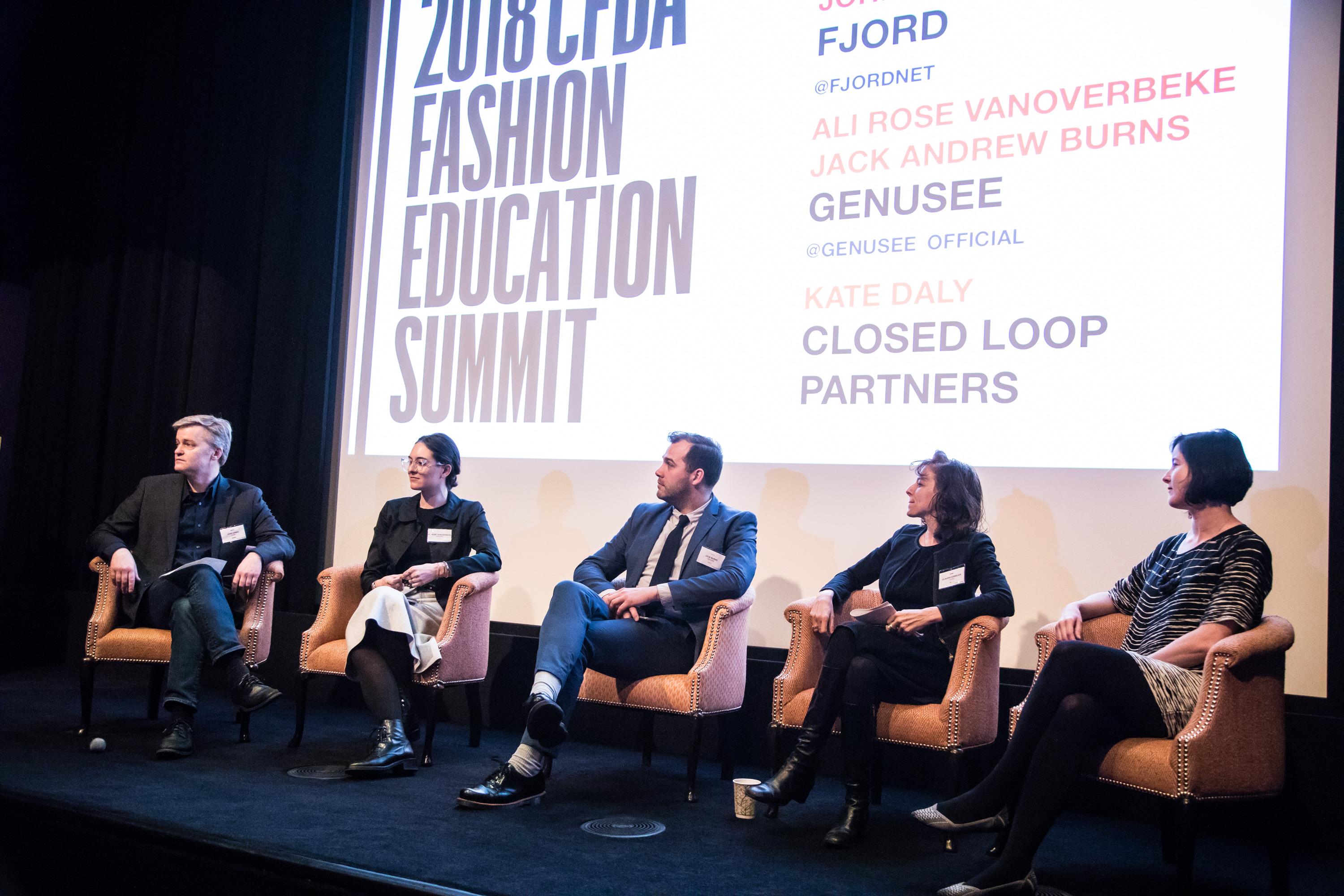According to the most forward-looking thinkers, the future of fashion is clean, ethical and sustainable.
This couldn’t be more apparent than at the CFDA’s Seventh Annual Fashion Education Summit, where the overarching theme this year was “Materials Matter.” Held from February 22-23, the summit addressed the timely subjects of the environment and science and how the two intersect within the fashion industry. With over 100 designers and educators which included Parsons School of Design, College for Creative Studies, and London College of Fashion, gathered at the Crosby Street Hotel to take part in conversations, workshops and panels that highlighted the ways in which fashion must unite so the future can survive.
The Summit opened with Emily Adams Bode, a Parsons graduate and CFDA Elaine Gold Launch Pad Fellow, who displayed a piece of clothing made entirely out of handkerchiefs culled from France. She explained how her fashion line takes seemingly unusable textiles and repurposes them into something both eye-catching and eco-friendly. “Sustainability comes from not just an environmental factor,” Bode said, “but through preserving history and re-contextualizing these stories to share with my consumer.”
Following Bode, Cyrill Gutsch and Marc Dolce, of Parley for the Oceans and Adidas respectively, took to the stage, Gutsch laid out the amount of plastic in the oceans today, and summed up how his company is fighting against worldwide water pollution:. “Survival is the new super-trend.” Parley has partnered up with Adidas to produce a new line of shoes made out of plastic ocean debris.
Gutsch believes that “fashion celebrates plastics in its purest form,” which is why the needs to, “support with every product we make the removal of plastic from an environment where it doesn’t belong.”
Marc Dolce, Vice President and Creative Director of Adidas Brooklyn Farm, started off his presentation by reminding the crowd that the three stripes signal a commitment to move away from virgin plastics. He went on to highlight Adidas Brooklyn Farm and how its creator outreach program is bringing in new designers with an environmentally-oriented mindset. “We are pretty much driving the material revolution together,” he said.
Yuly Fuentes-Medel, Executive Director of Fashion Descience, focused on a more scientific topic: the intersection of Design and Science termed as Descience. “What happens if we put a scientist and a designer in the same room?” Fuentes-Medel pondered, before displaying examples from her Descience program, which paired scientists and designers from all over the map and highlighted a dress made with textiles based on bacteria destroying cancer cells.
Two dual diploma students from the Wharton School and University of Pennsylvania School of Engineering studying in The Jerome Fisher Program in Management and Technologylaid out how the future of fashion manufacturing technologies is a lot closer than you might think — sew-bots, 3-D printers, and bonding and laser cutters are fast becoming an affordable alternative in the fashion industry. “We can have 3-D printed dresses and they’re cost-effective,” student Pranav Pillai said. His classmate Ece Nur Shain concluded their talk by saying, “Technology has already penetrated the pattern and design making industry.”
Future Tech Lab Chief Innovation Officer Amanda Parkes offered the most extensive overview on how technology is changing the face of fashion today. Starting off with wearable technology, Parkes said that what is widely considered the norm – i.e. Fitbit, Apple Watch – is only skimming the surface. “We’re living in the fourth industrial revolution,” she noted, with an eye to companies that are creating products like orange fiber (Ferragamo), leather made from stem cells (Vitro Labs) and spider silk (Bolt Threads)
Next on the docket were the founders of Genusee, Ali Rose VanOverbeke and Jack Andrew Burns, alongside Kate Daly, Executive Director of the Center for the Circular Economy at Closed Loop Partners, in a panel moderated by Fjord’s John Jones and Claudia Gorelick. VanOverbeke and Burns,the former a CFDA Elaine Gold Launch Pad Fellows, revealed the next steps for their eyewear made from recycled materials in Flint, Michigan. “We’re starting with eyewear and who knows what’s next,” VanOverbeke said. Daly viewed Genusee as the first in a new style of fashion start-ups, “creating jobs and addressing the waste problem in Flint, Michigan and you’re doing that in order to create an incredible fashion product.”
The last three presentations focused on the steps some organizations are taking towards sustainability. Both Giusy Bettoni, the CEO and founder of Creativity Lifestyle and Sustainable Synergy (CLASS), and Amanda Johnston, Curator and Education Consultant of The Sustainable Angle, cited Salvatore Ferragamo’s collaboration with Orange Fiber. Marina Coutelan, Product Manager at Premiere Vision, furthered the message of sustainability by stating that, “Beyond creating new green products, you as a company have to go further.”
The event concluded with The Sustainable Angle, and Amanda Johnston encapsulated this year’s CFDA Fashion Education Summit in a few simple words. , “Sustainability is not a trend. It is now a critical imperative.” It is important, she reminded, “To dream of course, but to dream in a different way.”



